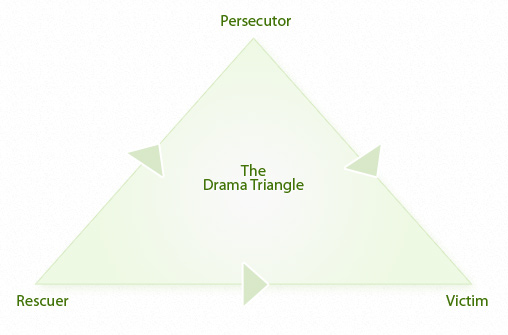The Drama Triangle Understand 'game playing' to help in day to day encounters
This activity is taken from the area of psychology known as Transactional Analysis (TA) and can help you in your day to day dealings with others and to avoid what is known in TA as 'game playing.'
Many of us will have found ourselves trying to help someone solve a problem, only to hear them repeatedly say, "Yes, but..." to our every idea. The purpose of this activity is:
- To understand the concept of games.
- To recognise when a game is being played.
- To develop strategies to move outside the game.
The Karpman Drama Triangle affirms that there are three habitual roles which people often take in a situation:
- The person who is treated as, or accepts the role of a victim
- The person who pressures, coerces or persecutes the victim
- The rescuer, who intervenes to help the situation or the underdog
You can see this represented in the diagram below:

The covert i.e., unconscious purpose of each "player" is to get their unspoken psychological wishes met in a manner in which they feel justified, without having to acknowledge the harm done in the situation as a whole.
As such, each player is acting upon each of their own selfish needs rather than acting in a genuinely adult, responsible or altruistic manner.
Games are always a substitute for a more genuine and full adult emotion which would be a more appropriate response. Games always have a psychological payoff for those playing it. The way to break it lies in discovering how to deprive the players of their payoff.
For the drama triangle to come into full flower, one of the players must shift position.
Here is an example of how it works in the real world:
See if you can spot at which points the players shift their positions and the effect this has upon the interaction
- (John) I am so unhappy at work. I had another argument with Bob today. I just feel that it's never going to work out.
- (Mary) Why don't you speak to your supervisor? He could help.
- Yeah, but it's not his problem, is it?
- OK, well you could try.
- Yeah, you can see me doing that...he's one of the problems.
- How about writing to the MD? I'm sure he'd like to know what's going on in the workplace.
- You don't get it, do you? If I did that, my supervisor would make my life a misery.
- Well, why the hell are you talking to me about it then? You're obviously not in the slightest bit interested in actually solving the issue. You just want me to make all the concessions. You're always moaning.
- You just don't pull your weight around here. You've never worked in all our years together. I don't know why I even bother talking to you about my problems.
- That's not my fault. You know how difficult things have been for me since my mother died.
- Sorry, I didn't mean to upset you... let's...
- Oh go to hell. I cannot stand the way you always criticise me.
How do you remove yourself from the triangle? As the example makes clear, this triangle can be exhausting as players begin and then continue to shift their positions or 'roles'.
The simplest method is the 'passive' response. This works at any point no matter what the role the other person is taking, as it doesn't give a cue as to the next response.
Examples of Passive responses
- Yes, that's true.
- I'm sorry you're...
- Oh
- I see
- You may be right
To help give you a practical way of using the Drama Triangle, think of a recent situation at work or beyond in which you found either yourself or someone else playing the 'victim' with the 'yes, but' response.
It might have involved two, three or even more people in total. Was there a 'rescuer' and did that rescuer become frustrated? Did any of the individuals play the part of the 'persecutor'? Who swapped 'roles' during the game?
When you begin to plot the sequence and note the actual words used and to consider who was playing which roles and how the roles shifted, you'll begin to notice just how often this game is played.
Pay particular attention to your own roles and behaviour and see how you can begin to use the 'passive' response to avoid playing this exhausting and, ultimately, fruitless game.
New Line Ideas makes extensive use of psychological 'tools of the trade' to help you and your team function more cohesively. See how using these tools have helped clients on our testimonials page.
Let's take this further.
To benefit from an informal discussion on how New Line Ideas can help you achieve long lasting results, please contact us today.



